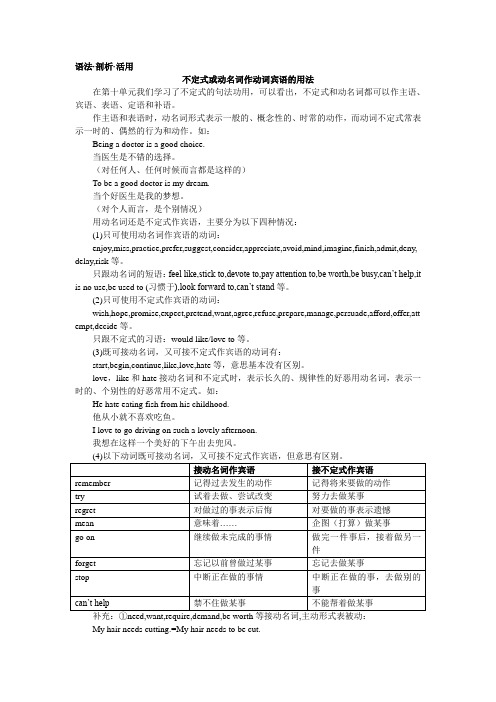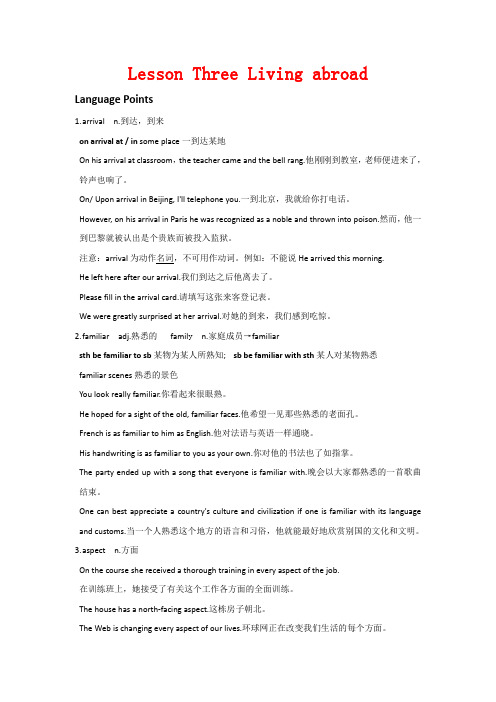高一英语Culture shock教案1
北师大版高一下Unit12《Culture Shock》(Lesson 3)ppt课件1

• Dialogue 2 • Martin: What did I learn from my exciting cultural exchange to China? Well, the Chinese are extremely hospitable. One evening, I was invited to a Chinese family dinner. I had a good appetite and ate a lot of delicious food. My host kept on putting more food in my rice bowl. They didn’t seem to hear me saying ‘No, thank you’. This was a very special experience I had in China. In my culture, you don’t get more food if you don’t ask for more.
God Freedom
New York
USA
Tea culture
Paper-cutting
drums
Lion dance
Dragon boat
Lantern & Qipao
Lucky knots
Folk art: tiger head shoes
Please read the two dialogues and answer the following question:
•
Warm up
Do you know something about America? Can you tell us some things the USA is most famous for? How about Chpictures…
culture shockPPT教学课件

his cigar. 作家全神贯注地写作,忘了弹去雪茄上的烟灰。
[考试题] ②(湖北黄冈)The writer was so ________ in her work that she didn't notice him enter the room.
[名师点评] 1. 本文运用了灵活多变的句式,不管是在遣词造句上,还是
从结构上都不失为一篇佳作。
2. 用于列举的副词:Firstly,Secondly,Next,Finally使 文章显得条理清楚。
3. 特殊的句式:when praised, when receiving, Anyhow, different cultures, different customs,省略句的运用以 及最后引用的谚语“Do as the Romans do when in Rome”使短文增色不少。
Anyhow, different cultures, different customs. If you “Do as the Romans do when in Rome”,you'll enjoy more of your stay here.
I hope what's mentioned above might be helpful and wish you a good journey. Yours sincerely, Li Hua
waiter or waitress—even a bit more if the service is good. 答案:leaving 10% of the bill
高一英语北师大版必修4学案:语法剖析活用 Unit12 Cul

语法·剖析·活用不定式或动名词作动词宾语的用法在第十单元我们学习了不定式的句法功用,可以看出,不定式和动名词都可以作主语、宾语、表语、定语和补语。
作主语和表语时,动名词形式表示一般的、概念性的、时常的动作,而动词不定式常表示一时的、偶然的行为和动作。
如:当医生是不错的选择。
(对任何人、任何时候而言都是这样的)当个好医生是我的梦想。
(对个人而言,是个别情况)用动名词还是不定式作宾语,主要分为以下四种情况:(1)只可使用动名词作宾语的动词:enjoy,miss,practice,prefer,suggest,consider,appreciate,avoid,mind,imagine,finish,admit,deny, delay,risk等。
只跟动名词的短语:feel like,stick to,devote to,pay attention to,be worth,be busy,can’t help,itis no use,be used to (习惯于),look forward to,can’t stand等。
(2)只可使用不定式作宾语的动词:wish,hope,promise,expect,pretend,want,agree,refuse,prepare,manage,persuade,afford,offer,attempt,decide等。
只跟不定式的习语:would like/love to等。
(3)既可接动名词,又可接不定式作宾语的动词有:start,begin,continue,like,love,hate等,意思基本没有区别。
love,like和hate接动名词和不定式时,表示长久的、规律性的好恶用动名词,表示一时的、个别性的好恶常用不定式。
如:他从小就不喜欢吃鱼。
我想在这样一个美好的下午出去兜风。
补充:①need,want,require,demand,be worth等接动名词,主动形式表被动:②不带to的不定式。
高中英语北师大版高一下册《 unit 12 culture shock 知识点》课件

完成句子 ⑤He was there at the request of his manager. 他依照经理的要求待在那里。 ⑥She requested that no one should be told of her decision. 她要求不要向任何人谈起她的决定。 ⑦You are requested not to smoke in the restaurant.请不要在餐馆里 吸烟。
fix one's attention on/upon专心于;关注 apply oneself to专心于;致力于 concentrate on全神贯注于;专心于 put one's heart into专心于
3.exchange vt.更换;交换n.交换;交流;互换 教材原句 ①Talking of money—it's really easy to exchange (exchange) traveller's cheques at banks or hotels so I advise you to get some of those before you umber of students in our class is (be) more than 70 and the majority of them are (be) from the countryside. ③The murder shocks the Americans, the majority of whom are (be) peace-loving and non-violent.
必修模块 4 Unit 12 Culture Shock
北师大版 高中英语
重点单词
1.owe v.欠(债等);归功于 教材原句 ①I certainly owe you an
高中英语:12.3《Culture shock》教案(北师大版必修4)

Lesson Three Living abroad Language Points1.arrival n.到达,到来on arrival at / in some place一到达某地On his arrival at classroom,the teacher came and the bell rang.他刚刚到教室,老师便进来了,铃声也响了。
On/ Upon arrival in Beijing, I'll telephone you.一到北京,我就给你打电话。
However, on his arrival in Paris he was recognized as a noble and thrown into poison.然而,他一到巴黎就被认出是个贵族而被投入监狱。
注意:arrival为动作名词,不可用作动词。
例如:不能说He arrived this morning.He left here after our arrival.我们到达之后他离去了。
Please fill in the arrival card.请填写这张来客登记表。
We were greatly surprised at her arrival.对她的到来,我们感到吃惊。
2.familiar adj.熟悉的famil y n.家庭成员→familiarsth be familiar to sb某物为某人所熟知;sb be familiar with sth某人对某物熟悉familiar scenes熟悉的景色You look really familiar.你看起来很眼熟。
He hoped for a sight of the old, familiar faces.他希望一见那些熟悉的老面孔。
French is as familiar to him as English.他对法语与英语一样通晓。
His handwriting is as familiar to you as your own.你对他的书法也了如指掌。
北师大版英语高一下册Module 4《Unit 12 Culture Shock》(lesson2)word教案

Unit12 Culture ShockLesson 2 Mind Your Manners教案Teaching aims:To practise using polite expressionsTo practise inferring speaker’s mood from tone of voice and intonationTo practise using phrasal verbsTeaching difficulties:To practise inferring speake r’s mood from tone of voice and intonationTeaching Aids: computer and cassetteTeaching procedures:Ⅰ. Warming upT: Different countries have different manners, but people use different ways to show their feelings,( teachers can guide student do the exercise 1.)Have students look at the scale of “degrees of showing emotion” and as a class discuss where they would place people from Italy, Japan, Britain and the USA. Encourage students to give reasons for their opinions and to comment on the stereo-types that these nationalities have in China.ⅡListeningListen to Part 1 of the interview about communication in different cultures. Comparewhat the expert says with your answers from Ex 1.Students listen to part 1of the interview and compare what the expert says with their answers from exercise 1The expert classifies Italians as affective people from Japan and Britain as “neutral” (with the Japanese being more reserved than the British) and Americans as mixed- neutral/affective.Do the exercise 3Give students time to look at the table and the entries for show anger in formal situationsPlay part 2 of the interview for students to complete the table if necessary, play the cassette twice. Do the exercise 5Play the cassette again, pausing after each dialogue, for students to complete the Function File.ⅢPronunciation: IntonationDo the exercise 6Students work in pairs, making a list of the expressions for the functions a-fCheck students’ answers by having them say the expressions politelyStudents listen and repeat the expressionsDo the exercise 7Tell students that the speaker, Christina, sounds rude on the cassette .Read through the four ways( a-d)of being impolite and rudePlay the cassette of the first item and look at the answer (b) with the classContinue playing the cassette for students to match the other reasons for sounding rude with the dialogues.ⅣSpeakingDo the exercise 8,Read the Strategies with the class. Tell students to think of these things before they start the roleplaysEncourage students act out their roleplays in pairs. Asking other students to point out their impolite mannersⅤHomework1. Write a short report to describe Chinese people.Are they open or reserved? Is formal language verydifferent from informal language? (Someinformation may be available on the Internet).2. Finish Ex 9 on Page 39.。
高一英语北师大版必修4教案:Unit12CultureShockPerio
Unit 12Culture ShockPeriod 6Grammar:Verbs Followed by -ing Form or Infinitive& Present Participles整体设计教学内容分析This teaching period mainly deals with the grammar items:Verbs followed by -ing form or infinitive and the usage of Present Participles.Try to discover and conclude the usage of the grammar by analyzing and practicing.三维目标设计Knowledge and skills1.To experience the usages of -ing forms,infinitives and present participles in contexts.2.To get students to know how to identify the differences between -ing forms and infinitives.Process and methods1.To ask students to observe some related sentences.2.To present more sentences and give them some explanations.3.To compare the differences between -ing forms and infinitives.4.To sum up what they have learned in the period.Emotion,attitude and value1.To get students to become interested in grammar learning.2.To develop students' ability to compare and summarize.教学方法Observation—Discovery—Induction,which is effective for grammar learners.教学重、难点The usages and differences between using -ing forms and infinitives.教学过程Step 1PresentationRead the text quickly to underline the sentences which use -ing forms or infinitives.1.I'm just so glad you can_afford_to_visit me and I refuse_to_let you pay for anything while you're here!2.To avoid_getting_confused about the British tipping system,you_need_to_check your bill to see if a tip is included or not.3.I suggest_leaving_10% of the bill for the waiter or waitress.4.I_advise_you_to_get some of those before you come.5.I think we should consider_staying in the English countryside for a few nights as I know you enjoy_hiking.6.I have learnt which ones are tasty and safe to eat so we won't_risk_getting sick!Step 2Observation and explanationFrom the sentences above we can see that some verbs can only be followed by -ing forms and some by infinitives.1.Verb+infinitive:1)动词+不定式ask,agree,begin,care,choose,dare,demand,expect,hope,fail,happen,help,hesitate,learn,manage,ought,plan,prepare,pretend,promise,refuse,want,wait,wish The driver failed to see the other car in time.司机没能及时看见另一辆车。
北师大版英语高一下册module 4unit 12 culture shockword学案
Lesson One Visiting BritainLanguage Points1.owe v. 欠债; 归于owe sb sth. = owe sth to sb. 欠某人某物;把…归于He owed his teachers his success.= He owed his success to his teachers.他把他的成功归功于他的教师们。
The man owed me 30 yuan for my work.那个人欠我工作的三十元。
He got a full mark in English competition yesterday, which he owes to his hard work.由于尽力学习的结果,昨天的英语竞赛他得了总分值。
owe it to …that clause / to do it 作形式主语,that从句或不定式作真正主语。
The boy owed it to the doctors that he was still alive.他至今还活着,这要归功于那些医生。
She owes it to herself to develop her skills.她靠自己进展了她的技术。
owing to 因为(常作状语)Owing to the rain they could not come.因为下雨,他们不能来.Several ships were lost at sea owing to the hurricane.由于飓风,好几艘船在海上失踪。
2.apology 道歉make an apology to sb for sth = apologize to sb for sth / doing sth =offer sb an apology = offer an apology to sbThe young man at last offered the lady an apology for knocking her down. = The young man at last offered an apology to the lady for knocking her down.= The young man at last made an apology to the lady for knocking her down.= The young man at last apologized to the lady for knocking her down.那个年轻人因为撞到那位女士最终向她道歉。
Unit11 Culture Shock英语教学课件
The Recovery Stage (3-6 months)
▪You develop strategies to cope with difficulties and feelings, make new friends. ▪ accept their problems and work on it ▪ compromise between exaggerated expectations and reality ▪ gain understanding of the new environment ▪ confusion and mix feeling ▪ pessimistic reactions and responses are lessened
dry mouth difficulty swallowing abdominal pain (especially in children)
Psychological symptoms of culture shock
psychological reactions to unfamiliar environments
combination of physical symptoms and psychological symptoms of culture shock
▪loss of ability to work or study effectively ▪unable to solve simple problems during daily life ▪refusal to learn the language ▪developing obsessions such as over-cleanliness excessive concern over health, security ▪withdrawal from people ▪spending too much time alone in their room (only socializing with people from their home country), etc.
高一英语北师大版4学案:Unit12CultureShockWarm-upandLesson1含解析
英语北师版必修4Unit 12Culture ShockWarm。
up &Lesson 1重要词汇1.I certainly owe you an apology for not writing more often。
→I certainly owe you an apology for。
.我为……向你表示抱歉。
2.I've just been so busy studying and trying to absorb all the new things around me-I think I’m still experiencing culture shock。
→I've just been so busy doing sth.我一直忙于做某事.3.I don't know what your expectations are of London,but knowing that you've never travelled outside of Asia,I thought I’d tell you a bitabout what you can expect to find.→I don't know what your expectations are of.。
我不知道你对……的期望是什么。
4.You don't have to book accommodation in advance as you will certainly manage to find a local person who will offer to put you up at a very reasonable price。
→You don’t have to。
.as。
. 你不必……,因为……5.When asked if they would show that they were angry at work,71%of Italians indicated that they would show this openly.→When asked if sb.would。
- 1、下载文档前请自行甄别文档内容的完整性,平台不提供额外的编辑、内容补充、找答案等附加服务。
- 2、"仅部分预览"的文档,不可在线预览部分如存在完整性等问题,可反馈申请退款(可完整预览的文档不适用该条件!)。
- 3、如文档侵犯您的权益,请联系客服反馈,我们会尽快为您处理(人工客服工作时间:9:00-18:30)。
3eud教育网 http://www.3edu.net 百万教学资源,完全免费,无须注册,天天更新! 3eud教育网 http://www.3edu.net 教学资源集散地。可能是最大的免费教育资源网! Lesson Three Living abroad Language Points 1. arrival n.到达,到来 on arrival at / in some place一到达某地 On his arrival at classroom,the teacher came and the bell rang.他刚刚到教室,老师便进来了,铃声也响了。 On/ Upon arrival in Beijing, I'll telephone you.一到北京,我就给你打电话。 However, on his arrival in Paris he was recognized as a noble and thrown into poison.然而,他一到巴黎就被认出是个贵族而被投入监狱。 注意:arrival为动作名词,不可用作动词。例如:不能说He arrived this morning. He left here after our arrival.我们到达之后他离去了。 Please fill in the arrival card.请填写这张来客登记表。 We were greatly surprised at her arrival.对她的到来,我们感到吃惊。 2. familiar adj.熟悉的 family n.家庭成员→familiar sth be familiar to sb某物为某人所熟知; sb be familiar with sth某人对某物熟悉 familiar scenes熟悉的景色 You look really familiar.你看起来很眼熟。 He hoped for a sight of the old, familiar faces.他希望一见那些熟悉的老面孔。 French is as familiar to him as English.他对法语与英语一样通晓。 His handwriting is as familiar to you as your own.你对他的书法也了如指掌。 The party ended up with a song that everyone is familiar with.晚会以大家都熟悉的一首歌曲结束。 One can best appreciate a country's culture and civilization if one is familiar with its language and customs.当一个人熟悉这个地方的语言和习俗,他就能最好地欣赏别国的文化和文明。 3. aspect n.方面 On the course she received a thorough training in every aspect of the job. 在训练班上,她接受了有关这个工作各方面的全面训练。 The house has a north-facing aspect.这栋房子朝北。 The Web is changing every aspect of our lives.环球网正在改变我们生活的每个方面。 3eud教育网 http://www.3edu.net 百万教学资源,完全免费,无须注册,天天更新! 3eud教育网 http://www.3edu.net 教学资源集散地。可能是最大的免费教育资源网! In aspect of quality, we are sure that no other brands can compete with ours.在质量方面,我们认为其他牌子的产品是无法与我们相比的。 What kinds of practical policies and measures do you have in this aspect?在这方面你们采取了什么切实可行的政策和措施? Mention a recent company event or express your interest in an aspect of the company that isn't widely known.说说公司最近发生的一件事情或者表达出你对公司里并不广为人知的一个方面的兴趣。 4. splendid adj.壮观的,极佳的,卓越的 splendid music美妙的音乐,splendid future光辉的前景the splendid dinner一顿辉煌的晚餐 5. outgoing adj.友好的,外向活泼的;喜欢外出的incoming 引入的 a warm, outgoing person热情友好的人 He's never been an outgoing type.他可不是那种好交际的人. 6. cautious adj.谨慎的,小心的 cautious 指“小心、谨慎地从事, 以防备可能出现的危险或差错”, 含有“提防”之意。 He was cautious about his work.他对工作非常谨慎。 A cautious mind is the half of wisdom.谨慎小心近于明智. She is cautious of telling secrets.她很谨慎,不会泄露秘密。 He is cautious in his choice of words.他措辞很谨慎。 The tour companies are very cautious about bad experiences.旅行社对产生坏影响的生意都很小心。 The surgeon was cautious to use the right instruments.那个外科医生很小心地选择他所用工具。 careful 属一般用语, 指“对工作、 责任等非常谨慎、周密的, 以免粗枝大叶而出错”,尤指“态度积极在细节上不出差错”如:Be careful not to fall.注意不要滑倒。 7. stare vi.盯,凝视,盯着,指由于好奇、惊讶、赞叹等原因而瞪大眼睛长时间地、直接地注视,常常含有粗鲁无礼的意思。 stare at sth / sb 盯着某物某人 It's rude to stare at other people.盯着别人看是不礼貌的。 She stared him into silence.她把他盯得不吭声了。 8. whisper vt. & vi.耳语,低声 3eud教育网 http://www.3edu.net 百万教学资源,完全免费,无须注册,天天更新! 3eud教育网 http://www.3edu.net 教学资源集散地。可能是最大的免费教育资源网! speak in a whisper低声说 She whispered a word in my ear.她悄悄对我说了一句话。 The boy whispered the news in her ear.那男孩对她悄悄说了这个消息。 whisper to sb对某人耳语 She once heard him whisper to another girl.她曾听到他对另外一个女孩说悄悄话。 The wind whispered in forest.风在林中飒飒作响。 It is whispered that ...据秘密传闻 It is whispered that Jim and Marry are to separate. 据小道消息,吉姆和玛丽要分手了。 9. custom n.风俗,习俗 custom 指“经过一段时期在某人、一国、一地区或一个社会中形成的传统的习惯或风俗”。 In China the custom prevails in eating dumplings on New Year's Eve.在中国, 除夕晚上吃饺子的风俗很盛行。 habit 指 “个人由于自然条件、社会环境、爱好或经常接触而导致习以为常的行为或特性”。 Smoking is a bad habit.抽烟是种坏习惯。 10.appetite n.食欲;胃口, 欲望, 爱好 to sb.'s appetite合某人的口味 [心意] = to one’s taste The fruit is to our appetite / taste. 这水果和我们的胃口。 an appetite for learning求知欲(嗜好学习) I have a great appetite for classical music.我非常喜好古典音乐。 Both had strong appetites for money.对于金钱,这两位都是狮子大张口。 She felt like in a fever, afraid of cold, light-headed, no appetite for food and a little stomachache.她还觉得发热、怕冷,头也昏沉沉的,不想吃东西,肚子还有些痛。 11.yummy = tasty adj.美味的,舒适的 I had a good appetite and the food was yummy. 我胃口很好,吃了很多可口的食物。 Yummy! Yummy! It tastes delicious. 好吃,好吃!味道好极了。 12.see off = send off给某人送行 The wives are used to stand by the door and see off their husbands to go to work, which is not usual now.妻子们过去习惯站在门口目送丈夫们去上班,这在现在已经不常见了。 I'll see you off at the airport.我将去机场送你。
